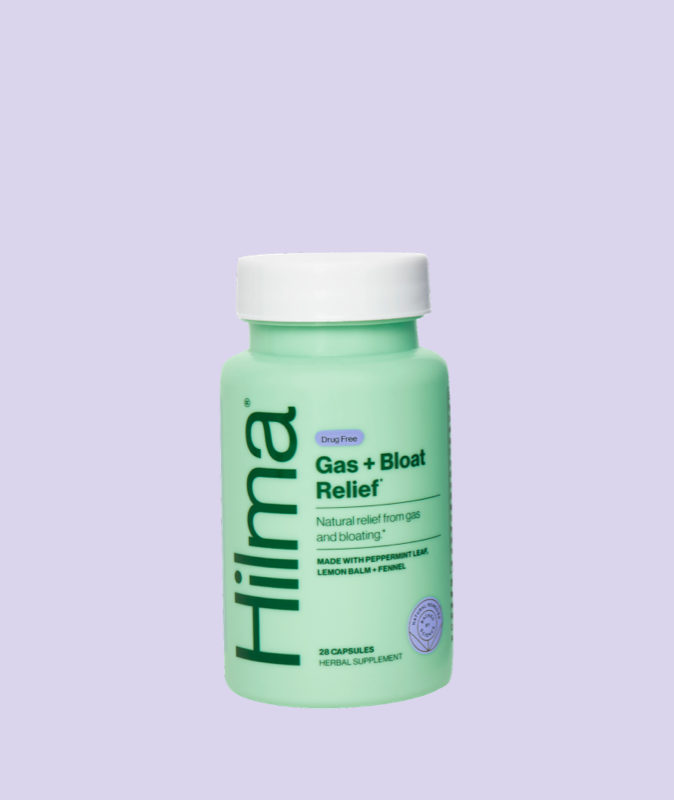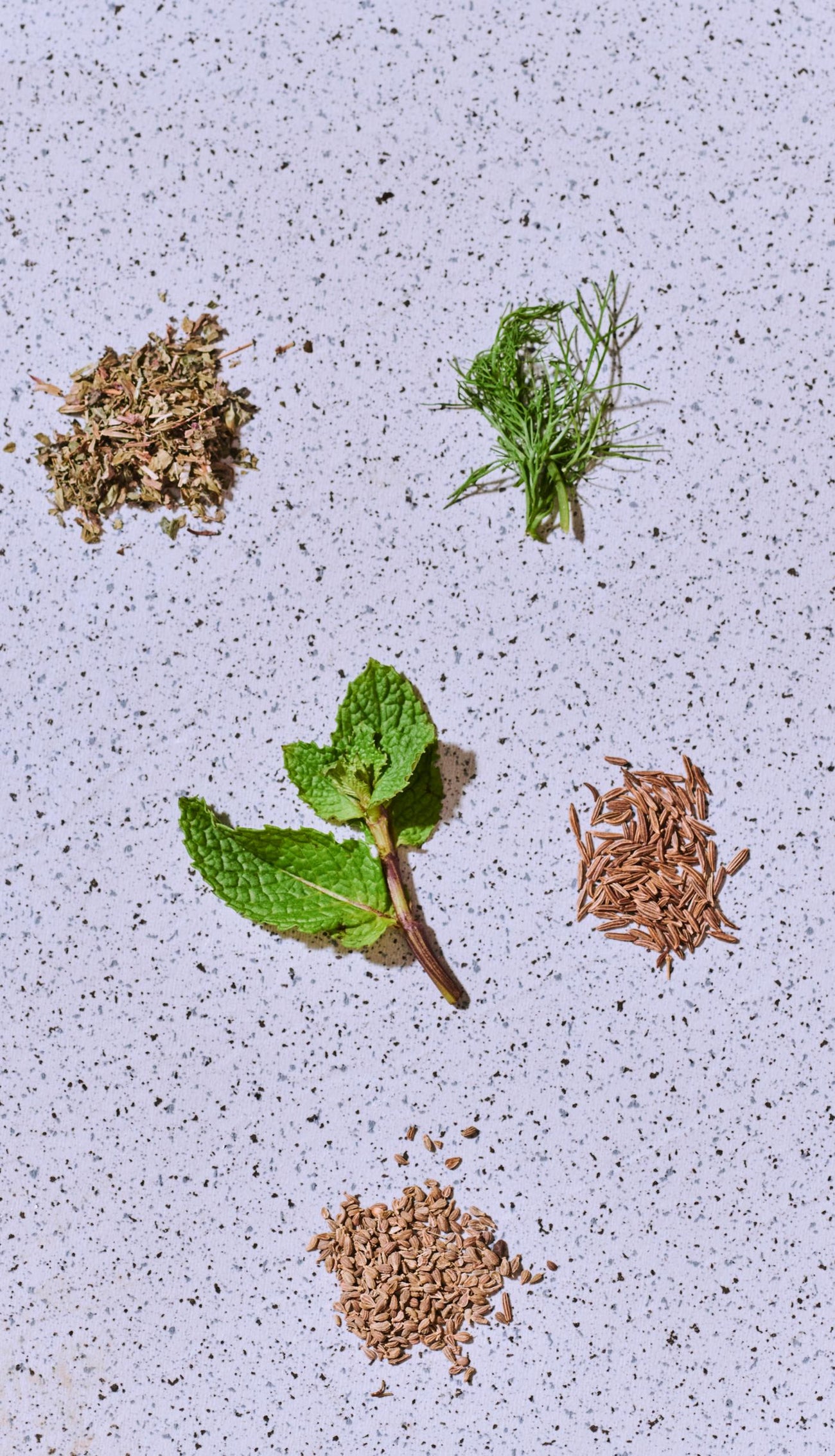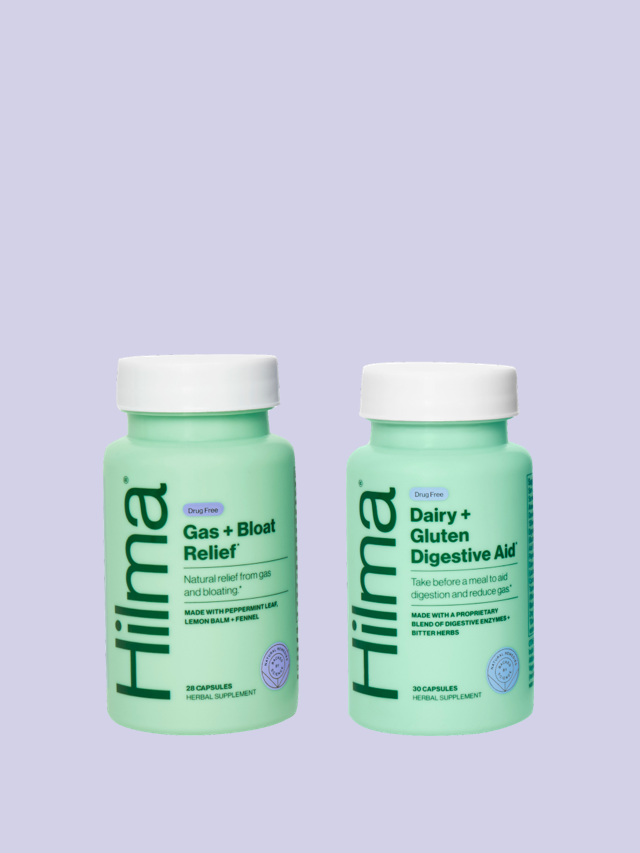
1. Ginger
Ginger has natural anti-inflammatory and digestive properties that can help reduce bloating and alleviate digestive discomfort by stimulating digestive enzymes and increasing bile production. Ginger’s compounds, such as gingerol and shogaol, have been shown to relax the gastrointestinal tract. This relaxation helps reduce gas build-up and promote digestion. Ginger also contains zingibain, a digestive enzyme, that can help break down protein. Ginger is traditionally thought to help reduce nausea, but can be applied to an array of gut issues. You can enjoy ginger as a tea on its own or incorporated fresh into meals. Ginger is an easy add-on to broths and soups or simply sliced up and placed in a mug of warm water with a bit of honey for a soothing remedy.
2. Sweet Potatoes
Sweet potatoes are a wonderful source of fiber, vitamins, and minerals. The fiber in sweet potatoes supports healthy digestion by promoting regular bowel movements and feeding healthy microbes. Additionally, the high levels of antioxidants, such as beta-carotene, help reduce inflammation in the gut, which can improve overall digestive function. Beta-carotene is the precursor to vitamin A and responsible for the vibrant orange color in sweet potatoes and carrots. Sweet potatoes also contain complex carbohydrates that help promote blood sugar stability to avoid blood sugar spikes and promote sustained energy. Incorporating sweet potatoes into your diet can aid in reducing bloating and improving digestive health, while offering essential nutrients like vitamins A, C, and potassium.
3. Bananas
Bananas are rich in potassium, which helps regulate sodium levels in the body and can prevent water retention. They also contain fiber, which promotes healthy digestion and can help prevent constipation, another cause of bloating.
4. Avocados
No one needs to tell me twice to enjoy avocado toast. Avocados, similar to bananas,
are high in potassium, a nutrient that helps reduce bloating. They are also rich in fiber, which helps promote healthy bowel movements and prevent constipation, a common cause of bloating.
5. Cucumbers
Cucumbers have a high water content and can help keep you hydrated, which may reduce bloating caused by water retention. Similar to how a cucumber sitting on your eye can reduce puffiness, it can do the same to your GI! Their natural diuretic properties can also aid in flushing out excess fluids.
6. Butternut Squash
Butternut squash is another fall vegetable high in fiber. The fiber helps maintain regular bowel movements and promote a healthy gut microbiome. By maintaining a healthy balance in bacteria, excessive gas is reduced, avoiding bloating. Rich in vitamins A and C, butternut squash provides anti-inflammatory benefits that may soothe the digestive tract. Its natural sweetness and creamy texture make it an excellent base for soups and purées, while also adding a nutrient-dense, low-calorie option to your meals. Incorporating butternut squash into your diet can help you stay fuller longer and promote better digestion.
7. Fennel
Fennel is a natural remedy for bloating and indigestion, known for its ability to relax the digestive tract and reduce gas. Its active compounds, such as anethole, fenchone, and estragole, have anti-spasmodic and anti-inflammatory properties that help alleviate digestive discomfort by easing muscle contractions in the gut. Fennel also promotes the production of digestive enzymes, making it easier for the body to break down food and prevent bloating. You can enjoy fennel raw in salads, roasted, or cooked in various dishes. Drinking fennel tea is another soothing option to relieve indigestion and bloating.
8. Asparagus
Asparagus is another natural diuretic, which means it can help reduce water retention and bloating. It also contains inulin, a type of fiber that promotes healthy digestion by supporting the growth of beneficial gut bacteria.
9. Chia Seeds
Chia seeds are high in fiber and can absorb water, forming a gel-like substance in the digestive tract. This can help regulate bowel movements and reduce bloating. Soaking them before consumption can make them easier to digest.
10. Cinnamon
Cinnamon has been used traditionally to soothe digestive discomfort and may help reduce bloating by relaxing the muscles in the gastrointestinal tract and improving digestion. The spice’s anti-inflammatory and antioxidant properties, particularly from compounds like cinnamaldehyde, aid in reducing gas and bloating while supporting overall gut health. Cinnamon can also help regulate blood sugar levels, which may prevent digestive imbalances that lead to bloating. You can sprinkle it on a variety of fall dishes, such as oatmeal, roasted sweet potatoes, or even add it to teas and warm beverages for a comforting, digestive-friendly boost. Some people even add a pinch to their coffee to help avoid a morning blood sugar spike.
11. Peppermint
Peppermint tea or peppermint oil can help relax the muscles of the gastrointestinal tract, making it a powerful remedy for reducing bloating and gas. The menthol in peppermint has antispasmodic properties, which soothe the digestive system by calming the muscles that can cause cramping, gas buildup, and bloating. Peppermint tea can help soothe issues within the gut while encapsulated peppermint oil is intended for the small intestine. The capsule helps allow the peppermint to reach the intestines instead of being broken down by stomach acid. Peppermint also promotes the flow of bile, improving digestion and easing discomfort. Whether consumed as a tea, added to foods, or used in oil form, peppermint is an effective and natural way to alleviate bloating and digestive distress.
12. Papaya
Papaya contains papain, an enzyme that aids in the digestion of proteins and can help reduce bloating. It also has anti-inflammatory properties and is rich in fiber, making it a great choice for digestive health. You can even find papaya enzymes as an encapsulated supplement.
13. Pineapple
Pineapple contains bromelain, an enzyme that aids digestion by breaking down proteins and reducing inflammation. This effect can help alleviate bloating and discomfort after meals.
14. Kiwi
Kiwi is rich in fiber and contains the enzyme actinidin, which aids digestion and can help reduce bloating. Its high water content also helps keep you hydrated, which can mitigate bloating caused by excess sodium.
15. Oatmeal
Oatmeal is a good source of soluble fiber, which can help regulate digestion and prevent constipation. Eating oatmeal can keep you full and satisfied, which may help reduce the likelihood of overeating and subsequent bloating.
16. Yogurt
Yogurt, especially those containing probiotics, can help maintain a healthy gut flora. Probiotics can improve digestion and reduce gas, leading to less bloating. Look for yogurts labeled "live and active cultures" for the best benefits.
17. Kefir
Kefir is a fermented milk product made with a combination of bacteria and yeast. Kefir is made with substantially more microbes than yogurt in both quantity and variety. These probiotics help balance the gut microbiome, improving digestion and reducing gas and bloating. Kefir contains microbes that break down lactose, the sugar in dairy. This breakdown is why kefir is easier to digest than other dairy products and can be a particularly good option for those who are sensitive to lactose.
18. Lemons
Water with a squeeze of lemon juice before a meal can stimulate your GI tract to
help prepare it for the food that is ahead. Lemon water is also a great reminder to
get some additional hydration! While it might seem counterintuitive, drinking water
can reduce bloating. The additional water can remove excess sodium that your
body is holding on to. Look at Hilma’s Debloat Lemon Recipe for an idea.
19. Celery
Celery is high in water and fiber, helping to prevent water retention and promote digestion. It also contains compounds that act as a natural diuretic, helping eliminate excess fluid.These compounds, called phthalides, help relax artery walls, increase blood flow, and support the kidneys in flushing out excess water and sodium.
20. Turmeric
Turmeric is a bright-yellow orange spice in the ginger family. Turmeric contains curcumin, a compound with anti-inflammatory properties that supports digestion and soothes the digestive tract. Curcumin also encourages bile production, a digestive fluid produced in the liver and stored in the gallbladder. It plays a key role in digestion, particularly in breaking down fats from food. Curcumin’s bile stimulation helps to break down food and prevent bloating.
21. Chamomile tea
Chamomile has calming and anti-inflammatory properties that can help soothe the digestive system. It is a well known flower in herbal medicine. Drinking chamomile tea may help reduce gas, bloating, and stomach discomfort, especially if bloating is linked to stress. Chamomile contains compounds such as apigenin, an antioxidant that binds to certain receptors in the brain, potentially promoting relaxation and better sleep.
22. Dandelion tea
Dandelion, both as a tea and bitter, is another excellent choice for reducing bloating. Dandelion is a natural diuretic and helps support liver function. It aids in bile production, which can help improve digestion and break down fats more effectively. This action can help reduce bloating and discomfort, especially after heavy or rich meals. It’s also known to have mild anti-inflammatory properties, which can further soothe the digestive system.
This information is for educational purposes only and should not be taken as medical advice. Please consult a physician before treating any disorder.



